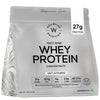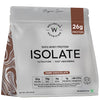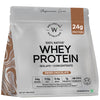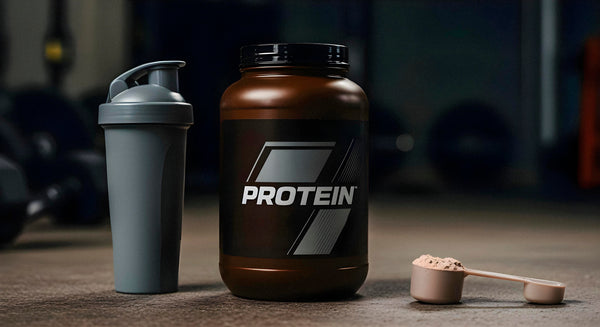If you've ever explored fitness or nutrition, chances are you've heard about whey protein. It's a go-to for athletes, gym-goers, and health-conscious individuals alike—praised for its ability to build muscle, speed up recovery, and boost overall protein intake. But what makes whey protein so effective, and how do you choose the right one for your needs?
Let’s dive into everything you need to know about whey protein, from its different types to its science-backed benefits and the best ways to incorporate it into your diet.
What Is Whey Protein?
Whey protein is derived from milk during the cheese-making process. It’s the liquid portion that separates from the curds and is then processed into a high-quality protein supplement. Packed with all nine essential amino acids, it’s a complete protein source that supports muscle recovery, strength, and overall health.
Types of Whey Protein: What’s the Difference?
Not all whey is created equal. Depending on how it’s processed, whey protein comes in three main types:
1. Whey Protein Concentrate (WPC)
-
Contains around 70-80% protein
-
Retains beneficial nutrients and fats
-
A great option for those who want a natural protein source with added health benefits
2. Whey Protein Isolate (WPI)
-
Ultra-filtered for 90% or more protein content
-
Mostly lactose-free and low in fat
-
Ideal for those who are lactose intolerant or prefer a purer protein source
3. Whey Protein (Concentrate + Isolate)
-
A combination of whey protein concentrate and isolate
-
Offers the benefits of both forms, ensuring balanced nutrition
-
A versatile option for individuals looking for comprehensive protein support
Whey Protein Benefits
Most people associate whey protein with fitness and muscle gain, but its benefits extend far beyond that:
1. Supports Muscle Building and Recovery
Whey protein is rich in branched-chain amino acids (BCAAs), particularly leucine, which plays a crucial role in stimulating muscle protein synthesis [NIH]. This helps repair and build muscle after workouts, making it an essential supplement for athletes and fitness enthusiasts alike.
2. Aids in Weight Management
Whey protein helps promote satiety, meaning it keeps you full for longer. This can reduce overall calorie intake and help with weight management. Additionally, a higher protein intake supports a higher metabolic rate, allowing the body to burn more calories even at rest.
3. Boosts Immune Health
Whey protein contains lactoferrin, immunoglobulins, and lysozymes, which help strengthen the immune system. These compounds support the body’s ability to fight infections and reduce inflammation, making whey protein a great addition to a healthy diet.
4. Enhances Heart Health
Regular whey protein consumption has been linked to improved cardiovascular health. It helps regulate cholesterol levels, lower blood pressure, and improve overall blood vessel function [NIH]. This makes whey protein beneficial not just for fitness goals but also for long-term heart health.
5. Supports Healthy Aging
As we age, muscle loss becomes a concern. Whey protein provides an easy way to maintain muscle mass and strength, reducing the risk of age-related muscle deterioration and improving overall mobility.
6. Improves Gut Health
High-quality whey protein is easy to digest and contains bioactive compounds that support a healthy gut microbiome. If you choose a clean whey protein, you’re also avoiding common gut irritants found in lower-quality supplements.
Why Clean Whey Protein Matters
Many commercial whey proteins are loaded with artificial flavors, preservatives, and unnecessary fillers. Choosing a clean whey protein—free from artificial additives, antibiotics, and hormones—ensures that you’re nourishing your body with the best.
Look for options like grass-fed whey protein that not only provide high-quality protein but also come with additional health benefits like better nutrient profiles and sustainability.
Additionally, check for Clean Label Certified products. This certification ensures that the whey protein you’re consuming is free from harmful additives, artificial preservatives, and contaminants, guaranteeing a safer and more effective supplement for your body.
Choosing the Right Whey Protein for You
With so many options available, picking the right whey protein can be overwhelming. Here are some key considerations:
-
Goal-Oriented Selection: If your focus is on muscle building and recovery, go for whey protein isolate due to its high protein content. If you prefer a balanced profile with added nutrients, whey protein concentrate is a great choice.
-
Digestibility: If you’re lactose-sensitive, opt for whey protein isolate, which is virtually lactose-free.
-
Ingredient Quality: Look for minimal ingredients, no artificial additives, and grass-fed sources.
Ways to Incorporate Whey Protein into Your Diet
Getting enough protein is essential, and whey protein makes it incredibly easy. Here are some ways to include it in your diet:
-
Blend it into a smoothie with fruits, nut butter, and almond milk
-
Mix it with oatmeal or yogurt for a protein-packed breakfast
-
Use it in protein pancakes or baked goods for a nutritious boost
-
Simply shake it with water or milk for a quick post-workout recovery drink
Final Thoughts
If you’re looking to enhance muscle recovery, support weight management, or simply boost your daily protein intake, whey protein is an excellent choice. But remember, quality matters. Opt for clean, grass-fed whey protein to ensure you’re getting the best without unnecessary additives.
Whether you’re a fitness enthusiast or just someone aiming for better health, whey protein is a simple yet effective way to support your nutritional goals.
Choose wisely and fuel your body the right way!




























